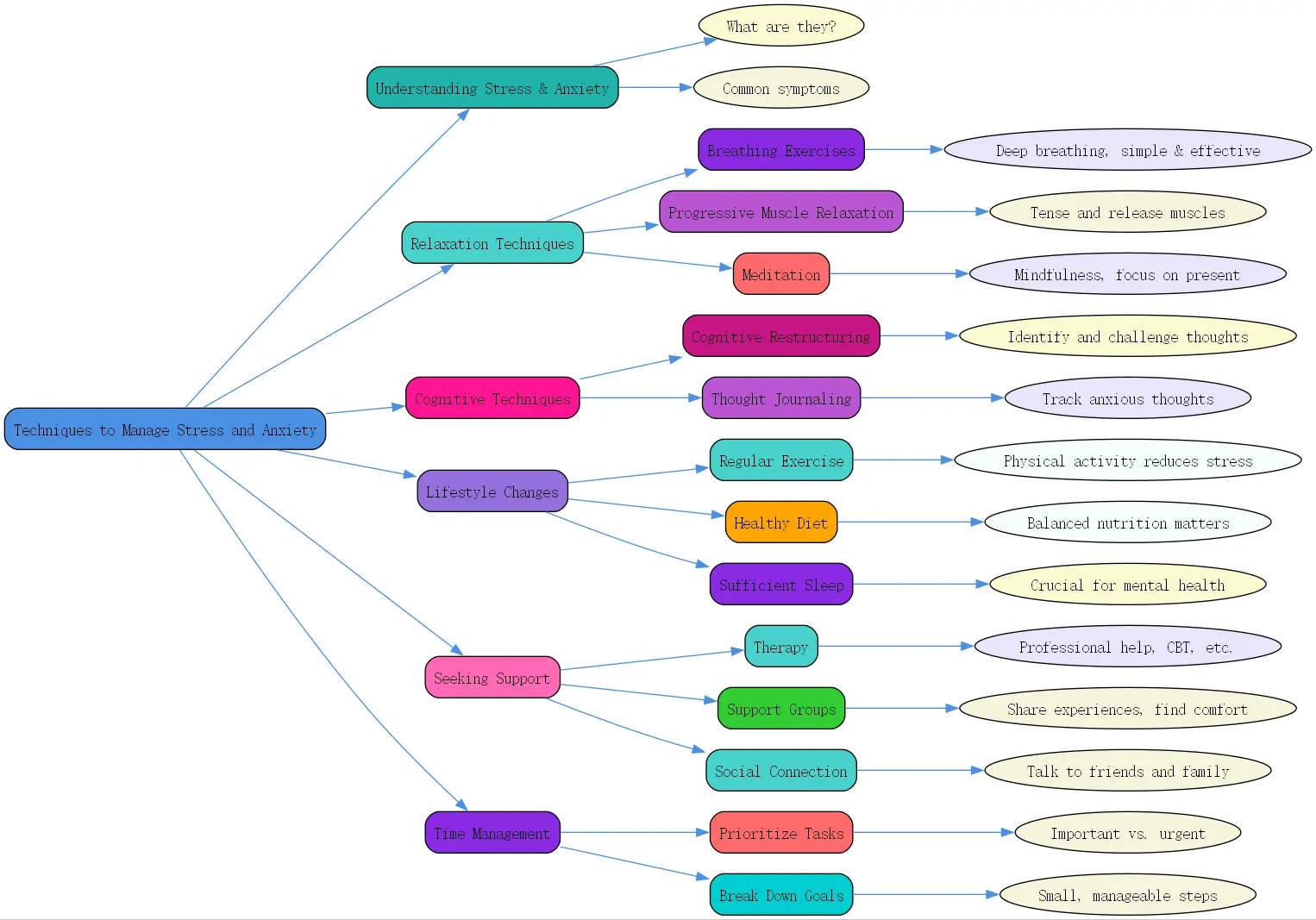Techniques to Manage Stress and Anxiety: A Comprehensive Guide

Stress and anxiety are challenges nearly all of us encounter at some point in our lives. From impacting work productivity to interfering with relationships, these overwhelming feelings can weigh heavily on health and happiness. Fortunately, there are practical techniques and strategies to manage stress and anxiety effectively, empowering us to rebuild balance in our lives. BrainTalking dives into actionable solutions while highlighting the importance of self-care and professional assistance.
Understanding Stress and Anxiety
Defining Stress and Anxiety: Recognizing the Symptoms
Stress is your body’s natural response to challenging situations, triggering a fight-or-flight mechanism. Anxiety, on the other hand, often stems from persistent worry or fear, even without immediate danger. Symptoms may range from muscle tension and headaches to difficulty sleeping or concentrating. Recognizing these signs is the first step in addressing them effectively.
The Impact of Stress and Anxiety on Your Well-being
Unchecked stress and anxiety can sabotage physical and mental health. They may increase the risk of cardiovascular disease, weaken immune function, and pave the way for conditions like depression or burnout. Additionally, personal relationships and daily productivity often suffer due to irritability, fatigue, or avoidance behaviors.
Common Causes and Triggers of Stress and Anxiety
Stress and anxiety develop from various sources, such as demanding workplaces, financial instability, health issues, or major life changes like pregnancy. For pregnant women, hormonal shifts compound physical and emotional stress, making it crucial to adopt suitable relaxation methods tailored to this life stage.
Effective Techniques to Manage Stress and Anxiety
Mindfulness and Meditation for Stress Reduction
Strengthen your mental well-being by practicing mindfulness and meditation regularly. Techniques like breathing exercises and body scans from books such as Mindfulness for Stress Management encourage relaxation while helping you stay present. These practices are proven to lower cortisol levels, reduce stress, and cultivate inner calm.
Cognitive Behavioral Therapy (CBT) Techniques
CBT equips individuals with invaluable tools to challenge intrusive thoughts and replace negative mental patterns with positive ones. Books like Feeling Good: The New Mood Therapy by Dr. David Burns outline step-by-step techniques to interrupt irrational beliefs, making CBT an essential strategy for tackling anxiety.
The Role of Exercise and Physical Activity
Physical activity isn’t just for body strength; it’s therapy for your mind. Books like Burnout: The Secret to Unlocking the Stress Cycle emphasize completing the “”stress cycle”” through activities like walking, yoga, or even dancing. Exercise enhances endorphins, effectively lowering anxiety levels and promoting mental resilience.
Breathing Exercises for Immediate Relief
Deep breathing is a quick, effective way to calm an anxious mind. Techniques such as diaphragmatic breathing directly counter the overactive nervous system, bringing immediate relief. Integrating breathing exercises into your routine can significantly reduce overwhelming moments of panic and stress.
Long-Term Strategies for Anxiety and Stress Management
Building a Strong Support System
Strong community ties foster resilience. Whether through family, friends, or mental health support groups such as the Anxiety and Stress Management Institute Atlanta, finding trusted individuals to confide in creates a protective layer against anxiety. Connection is key.
Setting Realistic Goals and Expectations
Unrealistic expectations often invite undue pressure. Breaking tasks into manageable steps and setting achievable objectives can help manage daily stressors effectively. Foster self-compassion and learn that being “good enough” is sometimes best.
Improving Sleep Hygiene
Poor sleep amplifies stress and anxiety. Practicing sleep hygiene—such as maintaining a consistent bedtime, reducing screen time before sleeping, and creating a calming nighttime environment—can significantly improve mood and cognitive function, easing anxiety struggles.
Healthy Diet and Nutrition
Diet plays a powerful role in mental health. Foods such as lean proteins, omega-3 fatty acids, and magnesium-rich snacks (e.g., nuts or seeds) contribute to mood stabilization. Avoid excessive caffeine and processed sugar, which can intensify anxiety symptoms.
Tips to Manage Stress and Anxiety: Practical Approaches

Quick and Easy Stress-Relief Techniques
- Deep Breathing Exercises: Slow, intentional breaths help calm your heart rate and mind.
- Progressive Muscle Relaxation: Slowly tense and relax each muscle group for immediate release of tension.
- Visualization and Guided Imagery: Picture a peaceful place (e.g., a tranquil beach) in detail, bringing focus and serenity to your mind.
Integrating Stress Management into Daily Life
Managing stress requires consistency.
- Time Management Strategies: Utilize planners or apps to schedule tasks effectively, avoiding overwhelming last-minute rushes.
- Prioritizing Self-Care: Schedule “”me-time”” each day for calming rituals such as journaling or meditation.
- Learning to Say No: Protect mental bandwidth by declining extra obligations that stretch you beyond your limits.
Navigating Stress and Anxiety During Specific Life Stages
How to Manage Stress and Anxiety During Pregnancy
Pregnancy is both beautiful and mentally taxing. Hormonal shifts can heighten sensitivity to stress, but adopting safe relaxation methods—such as prenatal yoga or breathing exercises—helps restore calm. Building a support network of loved ones ensures smoother transitions during this transformative phase.
Managing Workplace Stress and Anxiety
Workplace challenges frequently trigger anxiety. Identifying triggers, such as unrealistic deadlines, helps you create strategies for prevention. Setting boundaries, practicing assertive communication, and managing workloads effectively are essential steps in mitigating occupational stress.
Resources for Stress and Anxiety Management
Anxiety and Stress Management Institute Atlanta: An Overview
Located in Atlanta, this institute offers evidence-based approaches and therapeutic interventions tailored to individual needs. From CBT programs to mindfulness training, their services provide comprehensive solutions to combat stress and anxiety.
Top Books and Online Resources for Anxiety Relief
Books like The Anxiety and Phobia Workbook by Edmund Bourne and Rewire Your Anxious Brain by Katherine Pittman highlight accessible, transformative coping mechanisms based on or supported by neuroscience and psychology.
Support Groups and Communities
Joining local or online groups connects individuals with shared experiences and coping techniques. Platforms like BrainTalking encourage collaboration, fostering a sense of belonging and empowerment during your journey toward peace.
Key Takeaways for Managing Stress and Anxiety
- Embrace mindfulness techniques and move toward calm with breathing exercises.
- Use CBT to restructure negative thought patterns into positive ones.
- Build a support network to strengthen resilience and practice self-care.
- For major life transitions such as pregnancy, approach stress with appropriate, safe techniques that focus on holistic well-being.
FAQ Section:
Q: What Are Effective Techniques to Manage Stress and Anxiety for Immediate Relief? A: Immediate relief techniques include deep breathing exercises, visualization, and progressive muscle relaxation. For instance, diaphragmatic breathing calms the nervous system and can ease anxiety within minutes. These approaches are easy to incorporate into daily routines or during moments of high stress.

Q: What Is the Anxiety and Stress Management Institute Atlanta, and How Can It Help? A: The Anxiety and Stress Management Institute Atlanta offers specialized therapeutic services, including mindfulness training, CBT programs, and workshops tailored to unique stressors. They provide actionable solutions through evidence-backed methods for managing anxiety efficiently.




